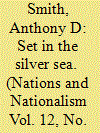| Srl | Item |
| 1 |
ID:
071637


|
|
|
|
|
| Publication |
2006.
|
| Summary/Abstract |
The English and the French are both former imperial peoples, and to that extent they share certain features of national identity common to peoples who have had empires. That includes a 'missionary' sense of themselves, a feeling that they have, or have had, a purpose in the world wider than the concerns of non-imperial nations. I argue that nevertheless the English and the French have diverged substantially in their self-conceptions. This I put down to a differing experience of empire, the sense especially among the French that the British were more successful in their imperial ventures. I also argue that contrasting domestic histories - evolutionary in the English case, revolutionary in that of the French - have also significantly coloured national identities in the two countries. These factors taken together, I argue, have produced a more intense sense of nationhood and a stronger national consciousness among the French than among the English.
|
|
|
|
|
|
|
|
|
|
|
|
|
|
|
|
| 2 |
ID:
071638


|
|
|
|
|
| Publication |
2006.
|
| Summary/Abstract |
Although many short-term reasons for a specifically English Euro-scepticism have been proposed, a long-term perspective is required to provide a fuller and more rounded treatment of this important and topical political issue. It needs to be grasped in terms of cultural, political and religious factors in English history, specifically, the antiquity and political character of a sense of English national identity, on the one hand, and on the other hand, the nature and impact of Protestant covenantalism. Among the factors that have shaped a sense of English national identity are its insular, geopolitical situation, the early development of a centralised English state, and the concomitant growth of a unified English legal system. To the existing sense of national identity under the Tudors was added a strong current of religious separatism, manifested first through Henry VIII's break with Rome and his vindication of monarchical supremacy in a national church, and second through the Puritan return to the idea of election modelled on the Old Testament narrative of the Exodus and Covenant of the Israelites. These currents have lent to the sense of English national identity a strong oppositional character, in contrast to the transterritorialism of Christendom characteristic of the leading Roman Catholic powers. This can be seen both by comparing English with French historical trajectories, and more recently, in terms of the separate, but allied, position of England in relation to European integration.
|
|
|
|
|
|
|
|
|
|
|
|
|
|
|
|